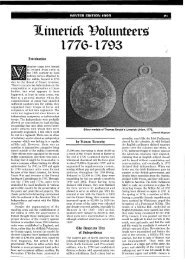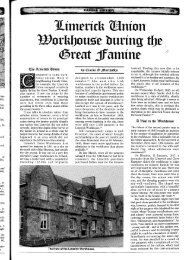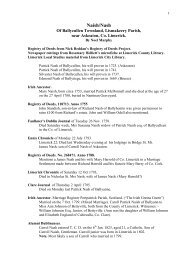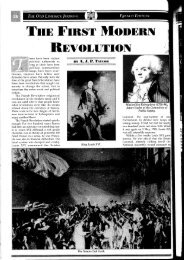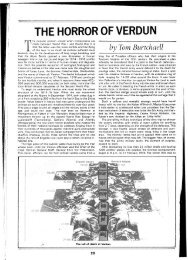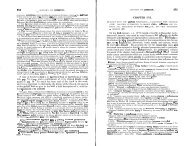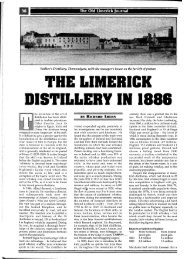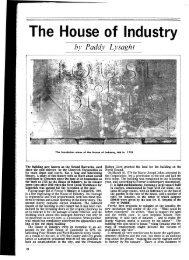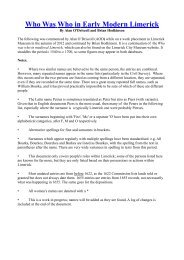The Limerick City Militia 1798 by Kieran Kennedy
The Limerick City Militia 1798 by Kieran Kennedy
The Limerick City Militia 1798 by Kieran Kennedy
Create successful ePaper yourself
Turn your PDF publications into a flip-book with our unique Google optimized e-Paper software.
elations between Catholics and Protes-<br />
tants, appealed to the revolutionary<br />
French government for assistance in over-<br />
throwing British rule in Ireland. In<br />
February 1793, France declared war on<br />
Britain, and two months later, fearing<br />
invasion, the government passed a new<br />
<strong>Militia</strong> Act for Ireland. <strong>The</strong> earlier<br />
Volunteers formed in the 1770s had grown<br />
to a strength of 100,000 unpaid men who,<br />
after the waning of the Continental<br />
military threats, had turned their attention<br />
to political reform, achieving legislative<br />
independence for the Irish Parliament in<br />
1782. <strong>The</strong>ir influence waned afterwards,<br />
and <strong>by</strong> the mid-1780s they were no longer<br />
a significant force in Irish politics. <strong>The</strong><br />
government was unwilling to risk a<br />
resurgence of Volunteer activity, and set<br />
out to establish a proper militia.<br />
<strong>The</strong> militia was created as an auxiliary<br />
to the standing army, and the principal<br />
duty envisaged for them was to provide<br />
the initial opposition to an invading force.<br />
<strong>The</strong>y also acted as a quasi-police force in<br />
the suppression of insurrection and<br />
agrarian crime <strong>by</strong> secret societies such as<br />
the Whiteboys.<br />
<strong>The</strong> militia was divided into 38<br />
regiments, of which 30 were county regi-<br />
ments. In Cork, Down and Mayo there<br />
were north and south regiments, and the<br />
remaining regiments were recruited in the<br />
cities of Cork, Dublin and <strong>Limerick</strong> and in<br />
the town of Drogheda. <strong>The</strong> officers were<br />
invariably propertied local magnates,<br />
although there was a significant number of<br />
English non-commissioned officers, and<br />
the rank and file were mainly Irish<br />
peasants and artisans, recruited on a<br />
voluntary basis or compulsorily through<br />
the drawing of lots in each parish. <strong>The</strong><br />
officers were usually Protestant, but<br />
overall Catholics were in a majority of<br />
almost three to one. To help with discip<br />
line, units were quartered away from their<br />
county of origin, and the quarters were<br />
changed frequently.<br />
<strong>The</strong> initial strength of the militia was<br />
15,000, but this number was increased to<br />
22,000 in 1795 and to 31,000 in 1802. When<br />
the immediate threat of a French invasion<br />
was removed <strong>by</strong> the Peace of Amiens in<br />
1802, the force was disembodied. <strong>The</strong><br />
militia was called upon again in 1803 for<br />
varying lengths of time until 1816. <strong>The</strong><br />
Crimean War necessitated re-embodiment<br />
for its duration, and in some cases for a<br />
further period to cover the Indian Mutiny.<br />
In 1881 the militia regiments were<br />
affiliated to the regular regiments of<br />
Irish infantry, and during the Boer War<br />
supplied units to serve in Gibraltar, Malta<br />
and even South Africa to release regular<br />
troops from peace-time garrison duty. In<br />
1908 the militia regiments were<br />
transferred to the Special Reserve. During<br />
World War I, they again did garrison duty,<br />
releasing the regular soldiers, although fit<br />
militia men could be transferred to the<br />
fighting units. <strong>The</strong> Irish <strong>Militia</strong> in the<br />
South were disbanded in 1922 at the same<br />
time as the parent regiments. Those in the<br />
North were suspended in 1921 while still<br />
carrying the title <strong>Militia</strong>, and were finally<br />
disbanded in 1953.'<br />
In 1796, in response to doubts about<br />
the loyalty of the militia, the government<br />
set up a part-time yeomanry force of about<br />
37,000, which was mainly made up of<br />
landlords and their own tenants, and was<br />
largely Protestant.<br />
<strong>The</strong> <strong>City</strong> of <strong>Limerick</strong> Regiment of<br />
<strong>Militia</strong> was raised early in 1793, consisting<br />
of 469 men under the command of John<br />
Prendergast Smyth, MP (afterwards first<br />
Viscount Gort), who was appointed<br />
Colonel <strong>by</strong> the Lord Lieutenant on 14th<br />
April. <strong>The</strong> County Regiment was also<br />
raised, its strength being 612 men with<br />
Lord Muskerry as c~mmandant.~ <strong>The</strong>ir<br />
uniforms were almost identical to those of<br />
the regular infantry, consisting of scarlet<br />
cloth with facings (collars, lapels and<br />
cuffs) of differing colours to distinguish<br />
one regiment from another. <strong>The</strong> facings of<br />
the <strong>City</strong> Regiment were yellow, while<br />
those of the County Regiment were blue."<br />
<strong>The</strong>y were armed with the Brown Bess<br />
flintlock musket, of which there were<br />
several variations.<br />
<strong>The</strong> other officers of the <strong>Limerick</strong> <strong>City</strong><br />
Regiment in May, 1793, were: Lieutenant-<br />
Colonel, Hon. Edmond Henry Pery<br />
(afterwards Earl of <strong>Limerick</strong>); Major,<br />
Charles Vereker (afterwards second<br />
Viscount Gort); Captain, George Gough;<br />
Captain-Lieutenant, Samuel Tomkins<br />
(afterwards major); Adjutant, Henry<br />
Horsfall, Lieutenant, 39th Foot; Lieutenant,<br />
John Waller (afterwards adjutant);<br />
Ensigns, Hugh Gough (afterwards Field<br />
Marshal Viscount Gough), David Nash<br />
(afterwards captain) and Exham Morony<br />
(afterwards lieutenant) .4<br />
At the outbreak of the <strong>1798</strong> Rebellion,<br />
the regiment was stationed in the province<br />
of Leinster and was constantly employed<br />
in quelling disturbances there. A letter<br />
'I<br />
from Lt.-Col. Gough of the <strong>City</strong> <strong>Militia</strong>,<br />
dated Edenderry, June 7th, is quoted in<br />
Lenihan?<br />
"I take the earliest opportunity of<br />
informing you that General Champaigne<br />
ordered me to march out at 11 o'clock<br />
last night with 100 of our regiment, and 7<br />
60 cavalry, to attack a rebel camp<br />
within six miles of this town. At five<br />
o'clock in the morning we arrived there,<br />
and found the rebels posted behind an<br />
amazing strong quickset ditch, and a bog<br />
in their rere. I ordered a troop of cavalry<br />
to get round them on the right, and so to<br />
be between them and the bog, which they<br />
could not effect, the country being so<br />
much enclosed. In the meantime the<br />
Infantry attempted getting round the<br />
flank of their camp, which they were so<br />
lucky as to efect, though they had to get<br />
over ditches strongly barricaded with<br />
strong stakes interwound with white<br />
thorns. <strong>The</strong> moment we entered the<br />
Rebel Camp they ran into the bog, to the<br />
number of3 or 400, where they found we<br />
directly advanced, upon which they fired<br />
a general volley at us, accompanied with<br />
a loud huzza, and began to retreat.<br />
Finding that they would not stand, I<br />
ordered a general discharge, with such<br />
efiect that they set running like furies; we<br />
pursued them across the bog to an island<br />
on which they had a post; this they<br />
abandoned on our getting near it; we<br />
still pursued until we got near the dry<br />
ground at the other side of the bog, where<br />
I knew General Champaigne and<br />
Colonel Vereker had taken a position,<br />
with a strong body of our detachment.<br />
Unfortunately some houses were set on<br />
fire, which caused the Rebels to change<br />
their course into the Great Bog of Allen;<br />
had it not been for that event every one<br />
ofthem must have either surrendered or<br />
been cut to pieces. In our pursuit of five<br />
miles we found ten dead, but am<br />
convinced numbers more were lying in<br />
the long heaths; for the first two miles<br />
they fired many shots, all which went<br />
over us.<br />
"It was surprising to see how regular<br />
they had their outflosts. Four miles fiom<br />
their camp we fell in with an advanced<br />
sentinel, capitally mounted and armed;<br />
on his attempt to join the rebels he was<br />
shot. We fell in then with their advance<br />
Piquet, who received so warm a<br />
reception that they were scampered of<br />
with the loss of their arms and some<br />
horses.<br />
"We found in their camp 48 fat sheep,<br />
20 cows and horses, which I am going to<br />
cant for the benefit of our men, who are
Statue to General Gough in the Phoenix Park, Dublin, c.1900.<br />
<strong>Limerick</strong> Museum.<br />
also returned loaded with great coats,<br />
blankets, shoes, pikes &c.<br />
"Nothing could equal the ardour of our<br />
<strong>Limerick</strong> lads; they would have burned<br />
down every house, and killed every man<br />
they met, had I not restrained them; they<br />
are the most desperate fellows I believe<br />
on earth, and I am sure loyal; not a<br />
man received the slightest wound."<br />
<strong>The</strong> following morning Gough received a<br />
letter from General Champaigne at<br />
Dublin:<br />
"Sir, I am this moment favoured with<br />
your report of the affair of Tuesday<br />
morning, for which I return you many<br />
thanks. I have not only acquainted the<br />
Commander-in-Chief, but the Lord<br />
Lieutenant, of your conduct and success,<br />
of which I was an eye-witness, and your<br />
not having lost a man in the action was<br />
a proof that your disposition of action<br />
was not only planned with judgement,<br />
but conducted with spirit."<br />
A letter from an officer of the <strong>City</strong> <strong>Militia</strong><br />
stationed at Edenderry and dated 1 July<br />
<strong>1798</strong> reads in part:<br />
7 have jmt returned in after giving the<br />
rebels a good drubbing. I marched<br />
against 300 of them with 60 men<br />
(infantry); I sent some cavalry to<br />
surround the hill where they were posted,<br />
but the moment I appeared they Bed,<br />
keeping up hot fire on us in every<br />
direction; However, we routed and drove<br />
them to the cavalry who gave them a<br />
warm reception. I am certain upwards<br />
of 300 of them were killed. <strong>The</strong>re was a<br />
Priest and a Captain Casey at their<br />
head, who were both killed; the latter<br />
being this townsman we brought him<br />
back where he now remains hanging."6<br />
On the arrival of the French under<br />
General Humbert at Killala Bay on 22<br />
August, the Regiment, under the<br />
command of Col. Charles Vereker, was<br />
ordered to Sligo. <strong>The</strong>y had reached<br />
Carrick-on-Shannon when the defeat of<br />
government forces at Castlebar on the<br />
27th August occurred, and carried on to<br />
Sligo.<br />
<strong>The</strong> small French expeditionary force<br />
under General Joseph Humbert was<br />
primarily an infantry force composed of<br />
the 70th Demi-Brigade, but did include<br />
artillerymen and some cavalry from the<br />
3rd Hussars, the whole amounting to<br />
about 1,000 men After taking Castlebar,<br />
Humbert, on the advice of his Irish allies,<br />
moved northwards, Sligo town being the<br />
next objective, where Col. Vereker's 600<br />
men of the <strong>Limerick</strong> <strong>City</strong> <strong>Militia</strong> was the<br />
principal garrison. Vereker was then 30<br />
years of age. He was born in 1768 in the<br />
old mayoralty house in <strong>Limerick</strong>, his<br />
father being mayor at the time. In 1782, at<br />
the age of 14, he was entered as a<br />
midshipman in HMS Alexander, a ship of<br />
74 guns, and saw service at Gibraltar, then<br />
under blockade <strong>by</strong> a combined French<br />
and Spanish fleet. <strong>The</strong> Alexander was one<br />
of three British ships laden with<br />
provisions that managed to pass the<br />
blockade, and Vereker was reported as<br />
being the first to leap ashore. On putting<br />
to sea again, his courage in the action<br />
between the two fleets earned him the<br />
public acknowledgement of the cm-<br />
mander, Lord Longford. With the peace of<br />
November 1782, the size of the navy was<br />
reduced, and Vereker retired from the<br />
service and took a commission in the 1st<br />
Royals, which regiment he left on coming<br />
of age in 1789. He was promoted to<br />
Colonel of the <strong>City</strong> <strong>Militia</strong> in 1797.8<br />
At about 9 o'clock on the morning of<br />
the 5th September, Captain O'Hara of the<br />
Liney yeoman cavalry, who commanded<br />
Vereker's advance piquet at Tubbercurry,<br />
reported to him that he had been driiren<br />
back <strong>by</strong> an advance force of the Fren~h<br />
after a short skirmish in which he had cine<br />
man killed and another wounded. Vereker<br />
considered that it would be better to<br />
attack rather than wait to be attacked, and<br />
marched out of Sligo with 250 <strong>Limerick</strong><br />
<strong>City</strong> <strong>Militia</strong>, two curricle guns, 30 yeomen<br />
infantry and a troop of the 24th Regiment<br />
of Light Dragoons towards Collooney,<br />
about five miles from Sligo.9<br />
Two rivers, the Owenmore and<br />
Owenbeg, join a short distance from<br />
Collooney and at the village itself flow into<br />
the River Arrow. <strong>The</strong>se rivers, over a<br />
rocky bed, plunge over ledges forming<br />
numerous rapids. A long range of well-<br />
wooded hills up to 900ft. high extends<br />
from close to the river at right angles<br />
eastwards. <strong>The</strong> road from Collooney to<br />
Sligo passes <strong>by</strong> the side of the river for<br />
about a mile and a half, turning around the<br />
extremity of the ridge at Carricknagat, and<br />
then over open level ground to Sligo.<br />
General Humbert's force at Collooney<br />
consisted of nearly 3,000 men, 1,000<br />
French, 250 men of the Longford and<br />
Kerry <strong>Militia</strong>s who had changed sides, and<br />
about 1,300 Irish insurgents of dubious<br />
quality. <strong>The</strong> basic weapon of the<br />
insurgents was the pike, but some had<br />
captured swords, pistols and muskets, and<br />
indeed some were actually supplied <strong>by</strong> the<br />
French, and they also had nine pieces of<br />
cannon.1° When General Humbert's force<br />
arrived at Collooney on 5th September, its<br />
intention was to rest, as they had been<br />
harried constantly <strong>by</strong> crown forces for<br />
eight days since they left Castlebar. One<br />
French eyewitness account says:<br />
"having arrived there, the men had just<br />
piled arms and dispersed, and were busy<br />
procuring provisions and firewood to<br />
make a meal, when suddenly the sound<br />
of the cannon and the shot that were<br />
flying into their encampment warned<br />
them of the enemy's approach. <strong>The</strong><br />
soldiers had only time to abandon, some<br />
their loads of firewood, others their<br />
provisions such as potatoes &c, and to<br />
hasten to get under<br />
Col. Vereker picked his position well at<br />
Carricknagat, his left protected <strong>by</strong> the<br />
river, his right resting on the hill, with his<br />
guns placed on the high road. His men<br />
were so disposed as to make the most of<br />
the little force as possible and at the same<br />
time conceal the smallness of their<br />
number. An advance guard of 100<br />
<strong>Limerick</strong> <strong>City</strong> <strong>Militia</strong> under Captain<br />
Vincent was sent out to watch the rebel<br />
movements, while Col. Vereker moved on<br />
with 20 of the 24th Dragoons, 30 Yeomen<br />
Cavalry, 250 <strong>Limerick</strong> <strong>City</strong> <strong>Militia</strong>, 20
Essex Fencibles and 30 Yeomen Infantry.<br />
When the advance guard came near the<br />
French, they received a smart fire which<br />
checked them a little, when Col. Vereker<br />
ordered Captain Waller and the <strong>Limerick</strong><br />
Light Company to advance and support<br />
them, while he formed his line and<br />
arranged his plan of attack on the main<br />
body. On his line being formed, he<br />
ordered Major Orms<strong>by</strong> and one company<br />
to occupy a post on the hill which covered<br />
his right and prevent the rebels from<br />
turning that flank, and he advanced on the<br />
right of the line with two curricle guns. Lt.-<br />
Col. Gough was ordered to take charge of<br />
the left. In a few minutes, at about 2.30 in<br />
the afternoon, the whole came into action<br />
with, on both sides, an unremitting fire of<br />
musketry and grape shot for nearly an<br />
hour and a half, with Major Orms<strong>by</strong>'s<br />
company on top of the hill taking the brunt<br />
of the action.12 On the French side, an<br />
officer, Jean-Baptiste Thomas,13 described<br />
that Col. Vereker:<br />
"debouchedfiom behind a mountain and<br />
on a high road which skirted it, about<br />
200 toises l426 yards] from Cloone<br />
ICollooneyl. We had made the mistake<br />
of not stationing on this mountain an<br />
advance post which would have kept<br />
watch on this point, and would have<br />
protected us from any su@rise attack ...<br />
<strong>The</strong>se troops were marching in column<br />
against our camp which had not yet been<br />
pitched in ICollooneyl itself, that is to<br />
say on a piece of level ground contiguous<br />
to this small market town where four<br />
high roads meet."<br />
"Happening to be one of the first under<br />
arms with a section of grenadiers, I<br />
marched to meet the enemy. I posted<br />
these grenadiers in ambush behind a<br />
wall of loose stones which surrounded a<br />
field; through the only opening in it ran<br />
the high road along which the enemy<br />
were coming, and who, seeing us in<br />
ambush at this post, considerably<br />
slackened their pa,ce, which gave our<br />
troops time to form and to execute a<br />
move to the enemy's right flank, to<br />
Possess themselves of the mountain<br />
which we have already mentioned,<br />
which the enemy, through lack of<br />
experience in warfare, had neglected to<br />
<strong>The</strong>ir artillery was still<br />
advancing, following their first line of<br />
march, and halting from time to time to<br />
fire.<br />
"I had made the grenadiers who were<br />
with me stop behind the wall which<br />
masked them, instructing them not to<br />
return fire with their Imusketsl, and<br />
only to fire when I should direct them to.<br />
I was waiting for the three pieces of the<br />
cannon of the English to be suficiently<br />
close to us, so that the shots we fired at<br />
them would be more accurate: therefore,<br />
when I saw them about thirty to forty<br />
Paces from us, I gave the order to fire<br />
and, having instructed [the grenadiers/<br />
to aim as carefully as possible at the<br />
gunners, aller a discharge that knocked<br />
down many gunners, we charged on the<br />
guns, which we took. Our column,<br />
Collooney medals presented <strong>by</strong> <strong>Limerick</strong> Corporation to<br />
privates of the <strong>City</strong> <strong>Militia</strong>, <strong>1798</strong>. <strong>Limerick</strong> Museum.<br />
having meanwhile possessed themselves<br />
of the height, fell on the enemy's right<br />
flank, routed them and took them<br />
prisoners. Only very few escaped. We<br />
released on parole the prisoners we had<br />
just taken, both officers and men,<br />
because we had no provisions to give<br />
them, nor any place to keep them, and<br />
we could on no account take them with<br />
us on our march."<br />
A Sligo gentleman, quoted in Lenihan's<br />
History,15 wrote:<br />
". .. at last supem'or numbers prevailed.<br />
Major Orms<strong>by</strong>'s detachment was obliged<br />
to retreat from the hill, and that post<br />
being given up, the enemy began to press<br />
round in numbers to the rere of the line.<br />
A retreat was then absolutely necessary<br />
to save those gallant fellows, who eve%<br />
then maintained their post, although<br />
their ammunition was nearly expended;<br />
never did any man show greater<br />
gallantry and coolness than Colonel<br />
Vereker at this trying moment; he never<br />
quitted his post whilst a man could stand<br />
<strong>by</strong> him, and when his artillery horses<br />
were so badly wounded that they could<br />
not bring away his guns, he attempted to<br />
have them brought of with ropes, and<br />
not until nearly surrounded on all sides<br />
did he leave them. <strong>The</strong> gallant and<br />
steady manner the oficers and scldiers<br />
resisted the attack of the united French<br />
and rebel army of above 4000 men,<br />
strongly posted, with nine field pieces,<br />
reflects the greatest honour on them, and<br />
has saved the town from ruin. <strong>The</strong> entire<br />
loss on the side of the king5 troops was 6<br />
killed and 21 wounded. <strong>The</strong> enemy had<br />
above 50 killed and wounded; many of<br />
the latter have since died in hospital<br />
here. <strong>The</strong> French fought with great<br />
bravery, and acted with humanity to the<br />
wounded oficers and men who fell into<br />
their hands."<br />
Col. Vereker himself reported his<br />
casualties as one officer and six rank and<br />
file killed, and five officers and 22 rank and<br />
file wounded.16 After the battle, he crossed<br />
the river in good order and returned to<br />
Sligo.<br />
A Church of Ireland clergyman, Rev.<br />
Edward Mangan, travelling with a militia<br />
regiment for protection came upon the<br />
scene after the battle?<br />
"Early on the 5th of September, our<br />
attention was roused <strong>by</strong> the noise of<br />
firing at no great distance, the cause of<br />
which was explained before mid-day;<br />
when we came among the dead and<br />
dying; field pieces overset, a broken<br />
bridge, the mangled carcasses of horses<br />
etc. Among the slain were several men<br />
in French uniform, some of whom<br />
belonged to General Humbert's force; but<br />
more proved to be British deserters. I<br />
noticed two or three wearing waistcoats<br />
distinguished <strong>by</strong> the buttons of the<br />
militia regiments they had forsaken, but<br />
having French coats on. This scene was<br />
the result of an exceedingly spirited<br />
proceeding on the part of the <strong>Limerick</strong><br />
regiment of militia, which was quartered<br />
in the town of Sligo; when Lord Gort,<br />
then Colonel Vereker, who commanded,<br />
proposed their going out and attacking<br />
the French battalion as it passed, so as<br />
to turn the enemy from his line of<br />
march. This was done accordingly; and<br />
the fortunate consequence was, that after<br />
a smart contest in which many lives<br />
were lost, the enemy's forces were<br />
compelled to take a diferent direction<br />
fiom that which they intended ..."<br />
<strong>The</strong> casualties of the <strong>Limerick</strong> <strong>City</strong><br />
Regiment in the engagement were:<br />
Officers: Ensign Rumley, shot through the<br />
body - dead. Captain Crips (severely<br />
wounded), shot through the neck and<br />
jaws. Slightly wounded: Colonel Vereker,<br />
Lieut.-Col. Gough, Major Orms<strong>by</strong>, Captain<br />
Nash, Ensign Bindon. Privates: Killed:<br />
John Wallace, Edward McMahon<br />
(McMahon afterwards returned to<br />
<strong>Limerick</strong>, not having been killed, but<br />
taken prisoner <strong>by</strong> the French). Missing:<br />
Timothy O'Sullivan. Badly Wounded:<br />
Corporal Kain. Slightly wounded: John<br />
Hickey, Patrick Hynes, Michael Harrison,
Jeremiah Leahy, James Sullivan, Patrick<br />
Nelson, Denis Godfrey, Nicholas Purcell,<br />
Timothy Bryan, Corporal Mahony.18<br />
After returning to Sligo, Col. Vereker<br />
evacuated his forces to Ballyshannon,<br />
leaving the town defenceless. However,<br />
Humbert presumed that Vereker's force<br />
was an advance guard of a much larger<br />
army, and he abandoned his plan to take<br />
Sligo, instead turning southwards to<br />
defeat at Ballinamuck on 8 September.19<br />
Why Col. Vereker left Sligo defenceless is<br />
unknown, but the feeling of the time is<br />
summed up in an article in the Dublin<br />
Evening Post of 29 September 179P0:<br />
"It is now ascertained that the design of<br />
the French General, after he had<br />
retreated from Castlebar, was to take<br />
possession of Sligo, and after pillaging<br />
that town, to proceed nortkwards toward<br />
the Co. of Donegal - and had he<br />
advanced towards Sligo after the affair<br />
with the <strong>Limerick</strong> militia at Colooney,<br />
that town must have fallen into his<br />
hands without opposition, its garrison<br />
having received orders to evacuate it<br />
and fall back to Ballyshannon ... of the<br />
plan of evacuating Sligo, and leaving<br />
that rich and populous town to the mercy<br />
of the enemy .. we cannot presume to<br />
speak; but we earnestly hope that it will<br />
never be thought necessary, under any<br />
circumstances, or in any instance, to<br />
resort to such a measure ..."<br />
Col. Vereker was ordered back to Sligo <strong>by</strong><br />
General Lake, as their absence was<br />
causing much uneasiness in the country.<br />
In <strong>Limerick</strong> and other parts of the<br />
country the action at Collooney was seen<br />
as a great victory over the French. A<br />
meeting of the Common Council in<br />
<strong>Limerick</strong> on 8 October <strong>1798</strong> resolved:<br />
"That the steady, loyal and gallant conduct<br />
of our fellow citizens the <strong>Limerick</strong> <strong>City</strong><br />
Regiment of <strong>Militia</strong>, who ... so intrepidly<br />
engaged and successfully opposed the<br />
progress of the whole French and Rebel<br />
Army ... merits our sincerest thanks and<br />
warmest applause ...". Dublin gave Col.<br />
Vereker the Freedom of the <strong>City</strong>, and<br />
from the High Sheriff and Grand Jury of<br />
Sligo came an address of "our warmest<br />
thanks .. to Col. Vereker ... for his<br />
uncommon exertions and intrepidity<br />
during a very severe action <strong>by</strong> which the<br />
enemy not only received a considerable<br />
check, but were diverted from their<br />
intended attack and pillage of the town of<br />
Sligo, and induced to direct their line of<br />
march another way."<br />
Nobody can doubt Vereker and his<br />
men's bravery. Bartholomew Teeling,<br />
Humbert's aide-de-camp, says "Humbert<br />
bore honourable testimony to the<br />
gallantry of Colonel Vereker, whom he<br />
pronounced the only British Officer he<br />
had encountered in Ireland who was<br />
capable of commanding a hundred men."<br />
Others were less complimentary. Col.<br />
Heyland wrote: "Colonel Vereker<br />
mistaking them for a common mob, drew<br />
out the city of <strong>Limerick</strong> <strong>Militia</strong> and<br />
attacked with only 200 men, but was<br />
obliged to retreat, leaving his battalions<br />
guns etc. Twelve yeomanry had the<br />
courage to fight their front posts but all<br />
were killed or taken prisoner." <strong>The</strong> Dublin<br />
Evening Post account on 8 September <strong>1798</strong><br />
reads: "Colonel Vereker, with a small<br />
detachment of the <strong>Limerick</strong> <strong>City</strong> <strong>Militia</strong>,<br />
hearing that only the rearguard of the<br />
Enemy occupied Colooney, attacked the<br />
town - but, as might be expected, was<br />
repulsed." A letter from an officer in the<br />
Reay Fencibles printed in the same paper<br />
on 25 September says bluntly: "<strong>The</strong><br />
French came that evening to Coloone,<br />
with five miles of Sligo, where they were<br />
met <strong>by</strong> the <strong>Limerick</strong> militia, whom they<br />
defeated and took their cannon from<br />
them."<br />
<strong>The</strong> Dublin Evening Post of 18 October<br />
<strong>1798</strong> reported a meeting of the <strong>Limerick</strong><br />
Common Council: "Resolved that the<br />
sum of fifty guineas be paid <strong>by</strong> our<br />
Chamberlain towards raising a fund to<br />
purchase a suitable piece of Plate for the<br />
Officers' Mess and proper medals for such<br />
of the non-commissioned officers and<br />
privates of the regiment as were engaged<br />
in the action that day." <strong>The</strong> Freeman's<br />
Journal of 24 August 1799 reported: <strong>The</strong><br />
Corporation and Citizens of <strong>Limerick</strong> have<br />
subscribed for very elegant Gold and<br />
Silver medals to be presented to the <strong>City</strong><br />
of <strong>Limerick</strong> <strong>Militia</strong> for their brave and<br />
valorous conduct at Collooney in resisting<br />
the French army under General Humbert,<br />
who sometime ago invaded this kingdom.<br />
<strong>The</strong> Gold medals are for the Serjeants, the<br />
Silver for the Privates; they have been<br />
manufactured <strong>by</strong> Messrs. James Brush<br />
and Son, of St. Andrew's Street, where<br />
they are now to be seen." Brush himself<br />
was probably not the artist of the medal,<br />
as an advertisement of his in 1789 reads in<br />
part: "In the Seal line he presumes to say,<br />
that no Person in this <strong>City</strong> can equal him,<br />
for neatness and durability of settings. He<br />
has engaged an eminent Seal Engraver<br />
from London, specimens of whose work<br />
are ready for inspection."<br />
<strong>The</strong> medal, which is known in silver<br />
only, has on the obverse, the arms of<br />
<strong>Limerick</strong> <strong>City</strong>, a gateway, with portcullis<br />
raised, between a pair of castellated<br />
towers, above, a conical turret with flag<br />
flying, enclosed in a spray of olive and<br />
spray of palm, ends tied, inscribed above,<br />
CORPORATION OF LIMERICK, and<br />
below, OF LIMERICK, and on the reverse,<br />
the imperial crown enclosed in two sprays<br />
of olive, ends tied, inscribed above, TO<br />
THE HEROES OF COLLOONEY, and<br />
below, 5TH SEPR. <strong>1798</strong>, with in smaller<br />
letters between the date and the tied ends<br />
of the sprays, BRUSH.<br />
Colonel Vereker had been elected MP<br />
for <strong>Limerick</strong> city in 1790, and was re-<br />
elected in 1797. In the preparations for the<br />
Act of Union, it is recorded that Lord<br />
Castlereagh was anxious to win his vote,<br />
and having approached him, received the<br />
simple and dignified reply: "Having<br />
defended my country with my blood, I<br />
shall never betray it with my vote." In<br />
every debate he raised his voice against<br />
the Union, and his name is recorded in<br />
every division.21 Others against the Union<br />
raised his conduct at Collooney in the<br />
debates. Mr. Frederick Falkiner said: " ... if<br />
it was not for the unparalleled gallantry of<br />
one regiment who stopped their career ...<br />
the French banditti would have reached<br />
this capital, while his Excellency's<br />
immense army had never seen them." Mr.<br />
Plunkett was even more eager to score off<br />
Lord Cornwallis <strong>by</strong> using Vereker: "I dust<br />
observe that whilst the military L$d<br />
Lieutenant was in the field with an army of<br />
60,000 men to support him, history will<br />
have it to record that we are indebted to a<br />
gallant Irishman (Mr. Vereker) at the<br />
head of about 800 native troops for having<br />
withstood the enemy. and prevented the<br />
capital of Ireland from being entered i~<br />
triumph <strong>by</strong> a body of not one thousand<br />
Frenchmen."22<br />
After the Union, Vereker was again<br />
elected MP (now the sole one) for<br />
<strong>Limerick</strong>. Under the administration of Pitt,<br />
he held the office of Lord of the Treasury<br />
from May 1807 to August 1810. In 1802 he<br />
was appointed Governor of <strong>Limerick</strong>, and<br />
in 1809 Constable of the Castle of<br />
<strong>Limerick</strong>, the last person to hold that<br />
office, which he held until his death in<br />
1842. In 1817 he succeeded his uncle as<br />
second Lord Gort, thus vacati. ' is seat<br />
for <strong>Limerick</strong> which he had regrcsented<br />
continuously for 27 years, having been<br />
elected MP seven times, always <strong>by</strong> large<br />
majorities.23<br />
REFERENCES<br />
1. Harris, R.C.: <strong>The</strong> Irish Regiments,<br />
Nutshell Publishing Co., Kent, 1989<br />
2. Lenihan, Maurice: History of <strong>Limerick</strong>,<br />
1866. p.386<br />
3. Thompson, F. Glenn: <strong>The</strong> UnZforms of<br />
<strong>1798</strong>-1803, Four Courts Press,<br />
Dublin, 1998<br />
4. Lenihan, p.753<br />
5. Lenihan, p.403-404<br />
6. Lenihan, p.405<br />
7. Thompson, op. cit.<br />
8. Lenihan, p.40&409<br />
9. Snoddy, Oliver: <strong>The</strong> <strong>Limerick</strong> Citv<br />
<strong>Militia</strong> and the Battle of Colloonev,<br />
<strong>1798</strong>. North Munster Antiquarian<br />
Journal, Vol. IX, No. 3, 1964<br />
10. Dowd, Rev. James: <strong>Limerick</strong> and Its<br />
Sieges, McKern, <strong>Limerick</strong>, 1890,<br />
appendix<br />
11. Van Brock, F.W.: A Memoir of <strong>1798</strong>,<br />
<strong>The</strong> Irish Sword, 1970<br />
12. Dowd, op. cit.<br />
13. Van Brock, op. cit.<br />
14. Major Orms<strong>by</strong>'s detachment was, in<br />
fact, stationed here<br />
15. Lenihan, p.411<br />
16. Snoddy, op. cit.<br />
17. Bourke, F.S.: <strong>The</strong> French Invasion of<br />
<strong>1798</strong>: A Forgotten Evewitness, <strong>The</strong><br />
Irish Sword, 1956<br />
18. Lenihan, p.410-411<br />
19. Snoddy, op. cit.<br />
20. This and other contemporary<br />
reactions are given in Snoddy, op. cit.<br />
21. Lenihan, p.413<br />
22. Snoddy, op. cit.<br />
23. Lenihan, p.415


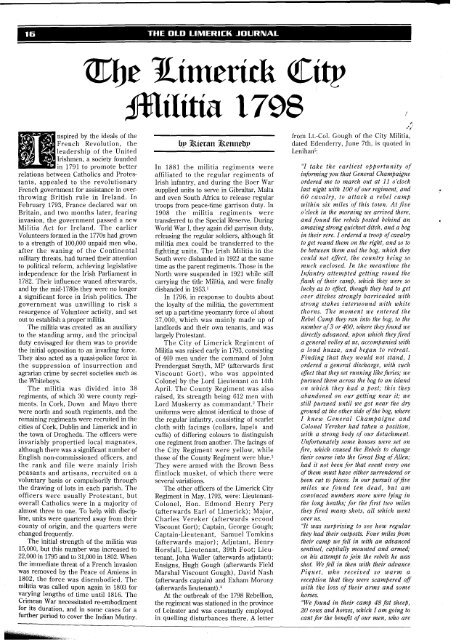
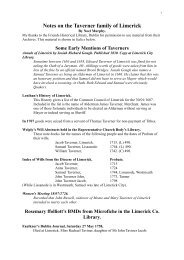

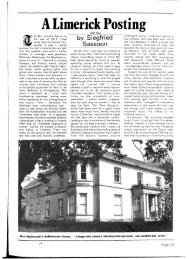
![The Galbally farmer [poem] by Darby Ryan - Limerick City Council](https://img.yumpu.com/24792577/1/190x260/the-galbally-farmer-poem-by-darby-ryan-limerick-city-council.jpg?quality=85)
